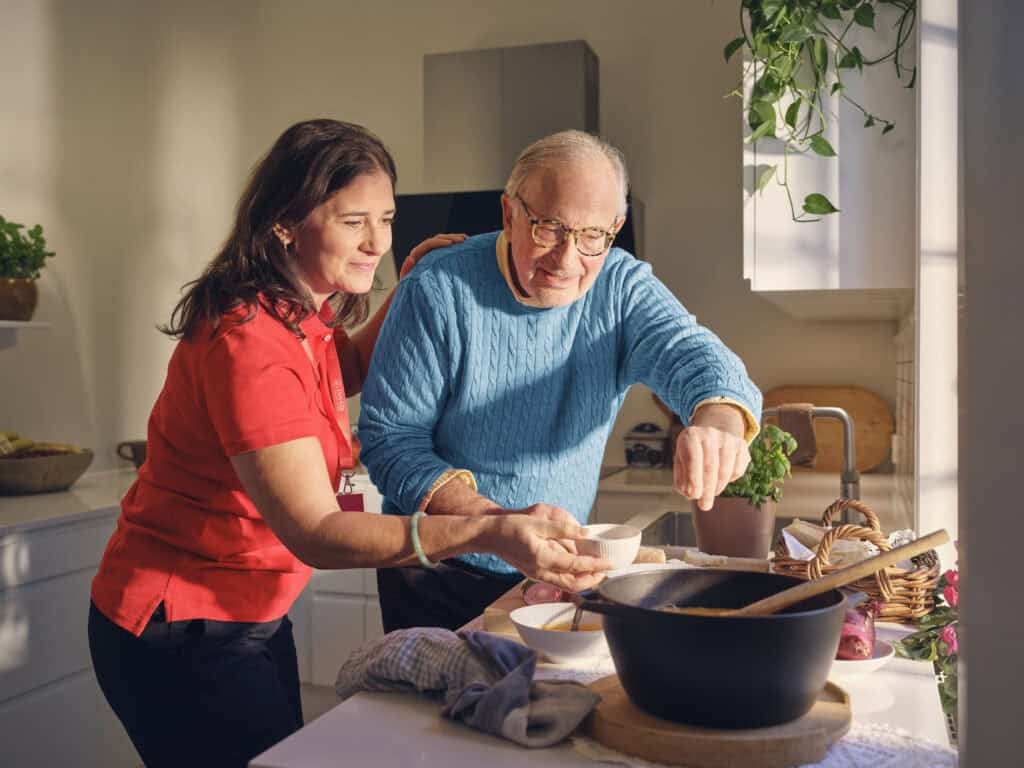Blog
25 September 2025
Your Guide to a Smooth Hospital-to-Home Transition
Returning home after a hospital stay represents a significant transition. In hospital, you’re surrounded by healthcare professionals and have immediate access to medical care. At home, you’ll need to manage your recovery more independently, which can feel daunting. This anxiety is completely normal and manageable with the right approach and support systems in place.
Before You Leave: Essential Preparations
Discharge Summary: This crucial document outlines why you were admitted, what care you received (including tests and procedures), and any medications you’re taking. It also includes a clinical summary of your current situation and any follow-up actions or appointments. Ensure your GP, pharmacist, and any care organisations supporting you receive a copy of this vital information.
Medication Management: Obtain a hospital medication discharge summary, prescriptions for ongoing medications, and information about any special dietary instructions. Confirm with medical staff exactly what medications you need and when to take them. Record contact details for your pharmacist or prescribing doctor in case problems arise.
Consider asking your pharmacist about arranging a medication organiser to make tracking your medications and supplements simple and hassle-free, helping prevent spills or mix-ups. This is also an excellent time to request a Home Medicines Review to ensure you’re taking everything correctly and nothing has passed its use-by date.
Preparing Your Home Environment
Practical Arrangements: Consider what help you’ll need to prepare your home for your return. This might include changing bed linen, cleaning the house, and stocking up on groceries and other essential supplies. Think about whether you’ll need assistance with daily tasks such as showering, laundry, or meal preparation during your recovery period.
Safety Considerations: Ensure your home environment supports your recovery. This might involve removing trip hazards, ensuring adequate lighting, and making sure frequently used items are easily accessible. If you’ve experienced reduced mobility, consider whether any temporary modifications might be helpful.
Building Your Support Network
Professional Support: Home care providers can offer comprehensive support, from transport services to settling-home services that ensure a smooth transition. They can manage home preparation, provide personal care, assist with meal preparation, and offer companionship during your recovery period.
Family and Friends: Don’t hesitate to reach out to your support network. Let family members and friends know about your return home and any specific ways they can help. Sometimes people want to help but aren’t sure what you need – being specific about your needs makes it easier for them to support you.
Embracing the Recovery Process
Have Patience with Yourself: Recovery takes time, and it’s normal to feel more tired or emotional than usual. Allow yourself the time and space needed to heal properly. There’s no need to rush back into all your normal activities straight away.
Gradual Independence: Focus on gradually resuming your normal activities rather than trying to do everything at once. This approach helps build confidence and reduces the risk of setbacks.
Celebrating Progress: Acknowledge the small victories in your recovery journey. Each day that you manage successfully at home is an achievement worth recognising.
Your Discharge Checklist
Leaving the hospital is a big step – feel ready and reassured by being able to answer ‘yes’ to the following questions:
✓ Have you seen your discharge summary explaining what happened in hospital?
✓ Do you understand what treatment you need now and in the future?
✓ Do you know which medications to take and when? Do you have enough until you can see your GP?
✓ Is any additional equipment required, and who’s arranging this?
✓ Are any dietary changes needed? Can you shop for food and manage meal preparation?
✓ What follow-up appointments are scheduled?
✓ Has your GP been informed of your admission and given your discharge plan?
✓ Do you need additional support for recovery, such as in-home care?
✓ How are you getting home – do you need transportation help?
✓ Have family, friends, or your care provider been contacted about your return? ✓ Do you have your house keys?
✓ Does your home need cleaning before your return?
✓ Are you cleared to drive when discharged?
✓ What’s the estimated recovery time or healing period for any wounds?
✓ Have you collected all personal items from the hospital?

